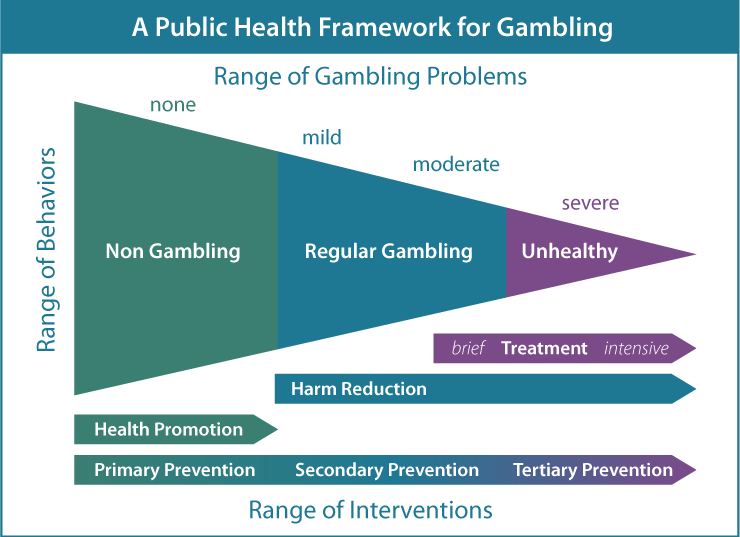
Though international and Irish research studies have consistently found weak links between certain lottery products and problem gambling, this does not mean that they are without risk.
The risk of problem gambling stems from three broad sources: the product characteristics, the place or environment in which they are sold or promoted, and the person who may, by virtue of young age, financial stresses etc. be more vulnerable to developing problems intrinsically. Problem gambling is characterised by difficulties in limiting money and/or time spent on gambling despite adverse consequences for the player, others, and the community. The harms that stem from gambling problems can include financial impacts, relationship conflicts, and/or a decline in health or wellbeing.
1. Measures in the Act and the Licence
3. Limiting and Preventing Risks to Players as part of a Public Health Approach
4. Timeline of New Measures to Prevent Problem Gaming
Measures in the Act and Licence
The Act and the Licence contain a suite of standards to protect players and prevent problem gambling that the Operator is required to adhere to. These include:
Products
Limits on the range of products that can be sold

Hours
Limits on the hours of sale and play

Age
Limits on the age of purchasers

Spend
Limits on the amount that can be spent online in a day, week or month

Marketing
Limits on promotional activities

Operations
A general obligation to operate responsible gaming practices that prevent problem gaming

Role of the Regulator
The Regulator holds the Operator to account in this area through:
- Rigorous analysis of game approval requests.
- Proactive monitoring of the online and retail sales environments.
- Assessing the Operator’s promotional activities against the prescribed Code of Practice.
- Researching and identifying processes and practices that have demonstrated effectiveness in preventing harm and have potential to improve the National Lottery’s measures.
- Commissioning independent primary research on preventing harm.
Since the commencement of the Licence in 2014, the Regulator has rejected schemes of games deemed to be of excessive risk to players, driven improvements in the accessibility and quality of information and measures to prevent problem gambling, and taken enforcement action for breaches of the Advertising and Promotion Code of Practice.
Limiting & Preventing Risks to Players as part of a Public Health Approach
The requirements in relation to player welfare provided for in the Act, the Licence (including Codes made under it) and in schemes of games approved under the Licence are best understood within the framework of a public health model of preventing avoidable harm.
The Regulator regularly reviews relevant international research and has commissioned a mystery shop exercise and independent research in Ireland to provide unique insights into Ireland’s National Lottery in practice, in order to continue to drive high standards of player protection and harm prevention into the future.

Primary Prevention measures involve preventing and delaying National Lottery play by minors, limits on product availability, and transparent and informative communications of game odds and risks associated with gambling.
For example: There are mandatory limits on how much a player can spend per day, per week, and per month on the National Lottery online. The Regulator has taken enforcement action against the Operator to ensure it systems are always operating correctly to prevent spending past these limits.
Secondary Prevention is focused on screening and monitoring for problems, including during game design, encouraging players to be well informed about how to gamble safely, and early interventions with players before indicators of potential player harm translate into problem gambling.
For example: Every proposed new game must be assessed with regard to the risk the game may present to a vulnerable player prior to launch. This assessment forms part of the Regulator’s considerations when the Operator requests approval of the game.
Tertiary prevention is concerned with preventing further or ongoing harm to those already showing signs of problem gambling and includes measures like screening and interventions, self-exclusion support and treatment services.
For example: The reverse of all scratch cards and draw-based game tickets, and the website and apps, provide a helpline number for players concerned about their gambling.
National Lottery play takes place in one of the most regulated environments for players in Ireland, compared to other types of gambling products, and it is evolving all the time.
The strong regulatory environment balances the right of consumers in their choice to play lottery games in a manner that is healthy while preventing and guarding against the risk of problem play. As the landscape for players evolves and changes, so too does the nature of regulatory oversight, checks and balances, for this balance to be maintained.
Examples of new measures put in place since the 2013 Act and establishment of the office of the Regulator of the National Lottery include:
2014
Self-exclusion facility made available to online players.
2015
All products and advertisements now carry a responsible play message.
2016
Expert assessment of game risk to vulnerable players.
2017
Operator forced to remove an advertisement presenting winning the National Lottery as a way out of financial difficulties or as an alternative to work.
2018
Test purchasing of sales to minors commences.
2019
"Think 21" campaign to prompt retail agents to ask for ID.
2020
Credit cards removed as a form of payment online.
2021
Scratch cards and online instant win games display the odds of winning the top prize.
2022
Roll out of mandatory verification of player age and identity for online accounts.
